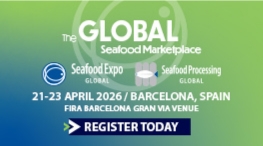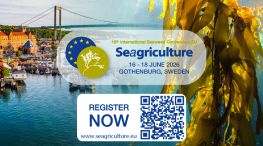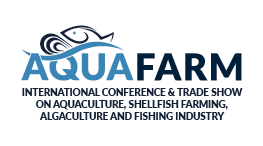Ukraine’s seafood business: Impacts of Russia’s war against Ukraine
This article was featured in Eurofish Magazine 2 2024.
Tamako-Invest LLC is a family-owned business with headquarters in Kyiv, founded by Kievan Jaroslav Novitsky. Eurofish interviewed Archil Tatrishvili, the company’s manager for foreign economic activity and an economist by background, a Georgian by ancestry, the founder’s son-in-law by family status, and a Ukrainian at heart.
This is the sixth in a series of articles in the Eurofish Magazine dedicated to seafood businesses in Ukraine and how they work and survive during the war.
Ukraine’s freshwater resources include over 60 thousand rivers, 50 thousand ponds, 20 thousand lakes, and over 1,100 water reservoirs. All these waters are home to about 200 freshwater fish species, and leisure fishing has always been a popular hobby for Ukrainians. Almost any adult Ukrainian born in the Soviet Union will remember a childhood treat: whole gutted, salted, and air-dried fish, that was caught and prepared by his or her father (mothers fished only rarely). The same treat accompanied by a glass of cold beer was also enjoyed by adults. Times, borders, and lifestyles have changed and now treats from the old days are available at a number of grocery stores, a development that can largely be credited to Tamako-Invest LLC.
Nearly one-third of the domestic market for dried fish
The company was established in 1995 under the name of Aris, and later renamed to Tamako-Invest. In the beginning, the company focused on imports of marinated sprats from the Baltic states, but in 2001 it switched to the production of dried freshwater fish—roach, bream, whitefish, rudd, smelt, herring, silver bream, and pike perch, among others. To attract younger consumers, says Archil Tatrishvili, we added a product line for snacks. The fish is skinned, filleted, and cut into strips—same fish but in a more modern presentation.
In 2009 Tamako opened a processing facility in Cherkassy region and today the range of products includes dried, smoked, chilled, and frozen fish. The palette of species comprises 15 freshwater fish sourced mainly from local waters and partly imported from Kazakhstan, and about six marine species being imported from Estonia, Latvia, and Finland. Since 2010 the company’s branded products have been sold through national retail chains. But not only humans can enjoy Tamako’s products: since 2023 fish delights are also produced for cats and dogs so they can dine on dried catfish, Baltic herring, round goby, salmon skins, and shrimp.
The company employs 130 people and its share of the domestic market for dried fish products is over 30% which makes Tamako-Invest Ukraine’s largest producer of dried freshwater fish.
Tastes differ
Dried freshwater fish is a niche product popular among Central—and Eastern European consumers, who, through several waves of migration, have spread around the globe. Tamako-Invest started exporting to the US, Canada, and Moldova, targeting this group primarily, but this was not enough. In 2015, the company obtained EU certification which grants exports to the countries of the European Union. Understanding that Western consumers do not have a tradition for dried freshwater fish products, the company diversified its exports by adding chilled and frozen fish and cuts, as well as relishes for pets. EU destinations include the Czech Republic, Estonia, Germany, Hungary, Poland, and Romania. Dried products dominate the company’s exports to destinations outside the EU, while within the EU fresh and frozen fish are more popular. The current split between domestic and international sales is about 50/50.
Family council determines the company’s future
Tamako-Invest is a family-run company, therefore its six adults make decisions about the future of the business. We discuss it both in the office and at home, explains Mr Tatrishvili, and even our dog is sometimes part of such meetings, tasting new products! Such councils are important, as we generate new ideas that help the company to stay in the market and develop. We understand that at some point the demand for dried fish will drop and then level off making our products exclusive to a certain group of consumers. We balance between the decline in demand for one product and the rise in sales of another, and we adapt.
Lack of human resources is one of the major problems during wartime
Shocking—not unexpected, but rather unbelievable—Russia’s invasion of Ukraine on the 24 February 2022 initially paralysed Ukrainian businesses, as people were thinking more about their country’s and families’ survival than about their businesses. However, everybody understood the importance of supporting the Armed Forces of Ukraine, the refugees, and the local population. There was even a competition between businesses over who would provide most support to the army.
From the very early stages of the war, Tamako has been providing help wherever possible. The company has a fund to finance the purchases of equipment for the army, as well as food, clothes, and other necessities for the civilians in need, and this help is not just a one-time, but a continuous effort. In general, I don’t like to talk about the problems, says Mr Tatrishvili, but the major issue now is the migration and the lack of skilled staff, as people want to move from the war as far as possible. We try to encourage, support, and create good conditions for old and new staff who have decided to stay in the country.
Can a war teach anyone anything?
We have survived the recession of 2007, the annexation of Crimea in 2014 and, so far, the war. From all this, we’ve learned to work under complicated conditions, explains Mr Tatrishvili, what can be worse and more difficult?! The war has shown us that our business can resist such challenges and remain stable. I hope that our children and grandchildren will be able to continue what we’ve started. I hope they will never experience what we experience now.
Aleksandra Petersen
aleksandra@eurofish.dk









